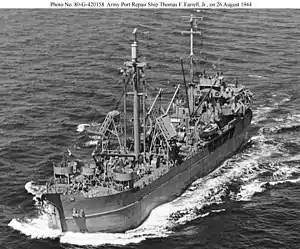 Sister ship USAPRS Thomas F. Farrel, Jr. underway off the East Coast of the United States, 26 August 1944. US National Archives photo # 80-G-420158 RG-80-G, a US Navy photo now in the collections of the US National Archives. | |
| History | |
|---|---|
| Ordered |
|
| Laid down | 24 January 1944 |
| Launched | 9 July 1944 |
| Acquired | 18 July 1944 |
| Out of service | 1959 |
| Stricken | date unknown |
| Fate |
|
| General characteristics | |
| Displacement | 1,677 t.(lt), 5,202 t.(fl) |
| Length | 269 ft 10 in (82.25 m) |
| Beam | 42 ft 6 in (12.95 m) |
| Draught | 20 ft 9 in (6.32 m) |
| Propulsion | Diesel, single shaft, 1,300shp |
| Speed | 10 kts. |
| Notes | The ship was under Navy supervision during construction, transferred to Army upon delivery to Navy and underwent extensive modifications for operation by the Corps of Engineers as a port repair ship. Subsequent Naval service was as unarmed, civilian crewed USNS Sagitta (T-AK-87). |
Sagitta (AK-87)[Note 1] was never commissioned and thus never bore the USS designation.[1]
The ship, contracted as the Maritime Commission MV Moses Pike, transferred to Navy supervision for construction and was then transferred shortly after launch as Sagitta (AK-87) to the Army to become the Engineer Port Repair Ship Marvin Lyle Thomas. She was one of two such repair ships transferred to Navy in 1952 and served as the civilian crewed, unarmed USNS Sagitta (T-AK-87). The ship may have been unique among her type in being then transferred back to the Army in 1966.
Construction
The ship was a Maritime Commission type N3-M-A1 cargo vessel hull (MC hull 650) assigned the name MV Moses Pike. The ship was transferred to Navy supervision for construction at the Penn-Jersey Shipbuilding Corporation, Camden, New Jersey and renamed Sagitta.[2] The ship was launched on 9 July 1944 sponsored by Mrs. Frank L. Hare.
Transfer to Army
On 18 July 1944 the ship was transferred to the U.S. Army for conversion into the Engineer Port Repair Ship Marvin Lyle Thomas for operation by the U.S. Army Corps of Engineers rehabilitating war damaged ports.
Marvin Lyle Thomas was one of the two last ships converted and was operational too late to participate in the postwar port rehabilitation to a significant degree.[3] Like her sister repair ship, Joe C. Specker (ex Vela (AK-89)), she remained operational with the Army until transferred to Navy's Military Sea Transportation Service (MSTS) in 1952.
MSTS Service Career
Transferred from the Army to the Navy under assignment to the Military Sea Transportation Service on 26 April 1952, Sagitta operated as a summer DEW line resupply ship out of New York City from 1952 through 1959. She steamed annually to St. Johns and Argentia, Newfoundland; and to Goose Bay, Labrador. She also voyaged to Cartwright, Labrador, annually except in 1954; to Makkovick, Labrador, annually from 1957 through 1959; to Resolution Island, Northwest Territories, annually except in 1952 and 1957; and to Narsarsauk, Greenland, in June 1954 and 1957. During the winters, she carried cargo to Bermuda; San Juan, Puerto Rico; and Cristobal, Panama Canal Zone, annually from 1953 through 1955; and to Guantanamo Bay, Cuba, in 1956. Occasionally sailing across the Atlantic Ocean, she visited Piraeus, Greece, from 9 to 12 February 1957, and Port Lyautey, Morocco, from 2 to 6 February 1958.
Transfer Back to Army
Transferred to the Maritime Administration on 23 February 1960, she remained in the National Defense Reserve Fleet until 25 April 1966 when she was transferred to the Army for duty as a training vessel, first at Fort Eustis, Virginia, then in about 1972 at Bayboro Harbor, St. Petersburg, Florida as USAV Resource[Note 2] and then at Curtis Bay, Maryland, where she provided stevedore training.
The vessel was scrapped in 1976.
Notes
- ↑ Only USS Enceladus (AK-80) of the ten ships of the Enceladus class, composed of Maritime Commission N3-M-A1 type small cargo vessels, saw significant naval service. Of the other nine, excpting USS Hydra (AK-82), all were transferred within months or days of shipyard delivery to Navy to the Army. Hydra was transferred to Army shortly after commissioning and trials. Navy had assumed the administration of contracts for these ships from the Maritime Commission on 1 January 1943 during or before construction and thus most were only administratively Navy, including names and numbers, during construction.
- ↑ Reference is a MS Word (.doc) from the United States Army Transportation School, Ft. Eustis, Virginia titled 231st Transportation Company (Floating Craft) (USAR) Archived 2009-03-27 at the Wayback Machine. Clicking the link will download the document. The referenced document contains an error in the comment indicating the FS-756 was the same as an "H 12 Model" as the FS and H/HA vessels were not identical Archived 2012-02-12 at the Wayback Machine. Further, though servicing "Texas Towers" may have been included in missions, smaller vessels generally served the towers and Sagitta missions noted above were heavier transport to shore installations.
References
- ↑ http://www.history.navy.mil/faqs/faq63-1.htm | Navy History & Heritage Command - Ship Naming in the United States Navy
- ↑ http://shipbuildinghistory.com/history/shipyards/4emergency/wwtwo/pennjersey.htm | Shipbuilding History: Penn-Jersey Shipbuilding Corporation, Camden NJ
- ↑ Grover, David (1987). U.S. Army Ships and Watercraft of World War II. Naval Institute Press. pp. 133–137. ISBN 0-87021-766-6.)
This article incorporates text from the public domain Dictionary of American Naval Fighting Ships. The entry can be found here.
External links